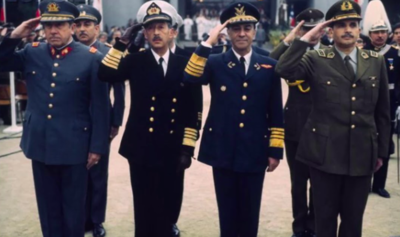Difference between revisions of "2003 Creeperian coup d'état"
| Line 50: | Line 50: | ||
}} | }} | ||
| − | The '''2003 Creeperian coup d'état''' ([[Creeperian Spanish]]: ''Golpe de Estado Creeperiano de 2003''), also sometimes referred to as '''The Coup''' (Creeperian Spanish: ''El Golpe''), '''The Restoration''' (Creeperian Spanish: ''La'Restoración''), or '''18-J''', was a military coup d'état in [[Creeperopolis]] that deposed the [[Alfonsisto|totalitarian government]]. On 18 June 2003, after four years of totalitarian rule, overt government corruption, political unrest, severe [[Hyperinflation in Creeperopolis|hyperinflation]], and surging crime rates, the [[Creeperian Armed Forces]], lead by Chief Field Marshal [[Augusto Cabañeras Gutiérrez]], Chief Admiral [[Edmundo González Robles]], and Chief General [[Arturo Merino Núñez]], seized power in a coup d'état | + | The '''2003 Creeperian coup d'état''' ([[Creeperian Spanish]]: ''Golpe de Estado Creeperiano de 2003''), also sometimes referred to as '''The Coup''' (Creeperian Spanish: ''El Golpe''), '''The Restoration''' (Creeperian Spanish: ''La'Restoración''), or '''18-J''', was a military coup d'état in [[Creeperopolis]] that deposed the [[Alfonsisto|totalitarian government]]. On 18 June 2003, after four years of totalitarian rule, overt government corruption, political unrest, severe [[Hyperinflation in Creeperopolis|hyperinflation]], and surging crime rates, the [[Creeperian Armed Forces]], lead by Chief Field Marshal [[Augusto Cabañeras Gutiérrez]], Chief Admiral [[Edmundo González Robles]], and Chief General [[Arturo Merino Núñez]], seized power in a coup d'état and established a [[Romerist Military Junta|short-lived transitionary military junta]]. The coup had the support of the government of [[Quebecshire]] and the [[Intelligence Directorate of Quebecshire]] (DRQ) which sent financial aid and military advice to the Creeperian Armed Forces. |
| − | [[Alfonso VI of Creeperopolis|Alfonso VI]] was proclaimed as Emperor in 1999 following the death of [[Romero III of Creeperopolis|Romero III]]. During his reign, the [[Economy of Creeperopolis|Creeperian economy]] suffered [[Hyperinflation in Creeperopolis|severe hyperinflation]], two unpopular treaties were signed with [[Mara Salvatrucha]] and the [[Militarist Front for National Liberation]], and the government was clouded by several scandals, most notably ''[[Marapolitics]]''. His regime has been labeled as totalitarian, and many criticized his reign during the regime. | + | [[Alfonso VI of Creeperopolis|Alfonso VI]] was proclaimed as Emperor in 1999 following the death of [[Romero III of Creeperopolis|Romero III]]. During his reign, the [[Economy of Creeperopolis|Creeperian economy]] suffered [[Hyperinflation in Creeperopolis|severe hyperinflation]], two unpopular treaties were signed with [[Mara Salvatrucha]] and the [[Militarist Front for National Liberation]], and the government was clouded by several scandals, most notably ''[[Marapolitics]]''. His regime was and has since been labeled as totalitarian, and many have criticized his reign during and after the regime. |
During the coup, the [[Creeperian Army|army]], [[Creeperian Navy|navy]], and [[Creeperian Air Force|air force]] attacked the [[Council of Mayors of Creeperopolis|Council of Mayors]] building in [[San Salvador (city)|San Salvador]] during a meeting of Alfonso VI with his [[Ministers of Creeperopolis|government ministers]] and high ranking loyalist mayors. Many were killed or later executed. The [[San Salvador Imperial Palace]] and other important government buildings were secured by the armed forces with little to no resistance from [[Creeperian Imperial Guard|imperial guardsmen]]. The military declared [[Martial Law in Creeperopolis (2003–2004)|martial law]] in the wake of the coup and a 10pm curfew was initiated across the country. | During the coup, the [[Creeperian Army|army]], [[Creeperian Navy|navy]], and [[Creeperian Air Force|air force]] attacked the [[Council of Mayors of Creeperopolis|Council of Mayors]] building in [[San Salvador (city)|San Salvador]] during a meeting of Alfonso VI with his [[Ministers of Creeperopolis|government ministers]] and high ranking loyalist mayors. Many were killed or later executed. The [[San Salvador Imperial Palace]] and other important government buildings were secured by the armed forces with little to no resistance from [[Creeperian Imperial Guard|imperial guardsmen]]. The military declared [[Martial Law in Creeperopolis (2003–2004)|martial law]] in the wake of the coup and a 10pm curfew was initiated across the country. | ||
Revision as of 01:54, 20 January 2021
| 2003 Creeperian coup d'état | |||||||||
|---|---|---|---|---|---|---|---|---|---|
| Part of the Creeperian Conflicts | |||||||||
 The military leaders of the coup. | |||||||||
| |||||||||
| Belligerents | |||||||||
|
|
Supported by: | ||||||||
| Commanders and leaders | |||||||||
|
|
| ||||||||
| Units involved | |||||||||
| Strength | |||||||||
| 650 soldiers | 102,180 soldiers | ||||||||
| Casualties and losses | |||||||||
|
459 dead 66 executed 125 imprisoned | 138 dead | ||||||||
| 597 military dead, 44 civilians dead, thousands missing | |||||||||
The 2003 Creeperian coup d'état (Creeperian Spanish: Golpe de Estado Creeperiano de 2003), also sometimes referred to as The Coup (Creeperian Spanish: El Golpe), The Restoration (Creeperian Spanish: La'Restoración), or 18-J, was a military coup d'état in Creeperopolis that deposed the totalitarian government. On 18 June 2003, after four years of totalitarian rule, overt government corruption, political unrest, severe hyperinflation, and surging crime rates, the Creeperian Armed Forces, lead by Chief Field Marshal Augusto Cabañeras Gutiérrez, Chief Admiral Edmundo González Robles, and Chief General Arturo Merino Núñez, seized power in a coup d'état and established a short-lived transitionary military junta. The coup had the support of the government of Quebecshire and the Intelligence Directorate of Quebecshire (DRQ) which sent financial aid and military advice to the Creeperian Armed Forces.
Alfonso VI was proclaimed as Emperor in 1999 following the death of Romero III. During his reign, the Creeperian economy suffered severe hyperinflation, two unpopular treaties were signed with Mara Salvatrucha and the Militarist Front for National Liberation, and the government was clouded by several scandals, most notably Marapolitics. His regime was and has since been labeled as totalitarian, and many have criticized his reign during and after the regime.
During the coup, the army, navy, and air force attacked the Council of Mayors building in San Salvador during a meeting of Alfonso VI with his government ministers and high ranking loyalist mayors. Many were killed or later executed. The San Salvador Imperial Palace and other important government buildings were secured by the armed forces with little to no resistance from imperial guardsmen. The military declared martial law in the wake of the coup and a 10pm curfew was initiated across the country.
The armed forces established a military junta and initiated large-scale purges of political and military officials. Cabañeras Gutiérrez gained significant power following the coup and is considered to be one of the most powerful people in Creeperopolis. The military proclaimed Alfonso VI's second and oldest surviving son, Alexander II, as the new Emperor, but the military held absolute authority and control until he was coronated on 15 September 2003 and the junta was officially dissolved. The military, however, continues to hold significant power and influence in Creeperian politics and national governance.
The coup marked a watershed moment in Creeperian history and began the true modernization of the nation and the resurgence of its economy. The coup has been proclaimed by Creeperian propaganda as an event which saved the nation from its impending demise and allowed Creeperopolis to "catch up" with the rest of the world.
Contents
Background
Political situation
Part of a series on the |
|---|
| History of Creeperopolis |
 |
|
|
Following the conclusion of the Creeperian Civil War in 1949, the victorious Catholic Imperial Restoration Council under Emperor Romero II established the Council of Mayors, the legislative body of the country that replaced the Parliament. The Imperial Council also established the Creeperian National Military Tribunal, the judiciary body of the country that replaced the High Court. Executive power in the country shifted from the abolished office of Prime Minister to the imperial throne, while office of Prime Minister was transitioned to the office of Chief Mayor. The nine ministries of the country remained in place, and most were dominated by the military until they were gradually given over to Initiative administration.
The Nationalist Creeperian Catholic Royal Initiative and the Pro-Fatherland Front of Unification, commonly known as the Creeperian Initiative or simply the Initiative, was established as the sole legal political party as a merger of right-wing political parties in Creeperopolis and its newly annexed territories of Atlántida and Castilliano. The Initiative held all 6,123 seats on the Council of Mayors, and it functioned effectively as a body that merely approved the actions of the Emperor, almost always voting unanimously in favor of bills.
On 16 October 1999, Emperor Romero III died without an heir, similar to his older brother, Adolfo V, who also died heirless. Romero III was succeeded by his younger brother, Alfonso VI. Upon the ascension of a new Emperor, it was customary to appoint a new Chief Mayor to replace the then incumbent Chief Mayor of the previous Emperor. Alfonso VI did appoint a new Chief Mayor, replacing Martín Gutiérrez Sánchez with Rubén Franco Alcabú, a supporter of Alfonso VI. He also appointed Franco Alcabú to Secretary of the Creeperian Initiative, a position that was held by Antonio Sáenz Flores, a member of the very influential and prominent Sáenz Family who was also the grandson of Antonio Sáenz Heredia, the founder of the Catholic Royalist Party and considered to be the most important Creeperian figure of the Second Parliamentary Era. Alfonso VI also replaced the then incumbent government ministers with his own supporters, something never done previously. Most consequentially, he replaced the Minister of Internal Affairs, Field Marshal Fortunato Galtieri Castelli, with Carlos Menem Menem, the first civilian to hold the position since Miguel Hidalgo Jímenez in 1933. Menem Menem was an Alfonso loyalist, while Galtieri Castelli was a military hardliner and had no blind support for the Emperor. Galtieri Castelli was forced into retirement, and the move was not well received by the military. As a part of the ceasefire, Alfonso VI canceled Project Atlácatl, a program of various experiments on human subjects that were organized by and executed by the National Intelligence Directorate (DINA), the intelligence agency of Creeperopolis, and in certain instances, the Army.[1]
Since 15 October 1979, Creeperopolis had been waging a war against Mara Salvatrucha, the country's largest and most powerful gang and criminal organization that practically functioned as a paramilitary, in the Mara War. Ministers of Internal Affairs Galtieri Castelli and Agustín Lanusse Melendez, both active Field Marshals during the terms, held a hardline anti-Mara stance and had a policy of no tolerance against Mara Salvatrucha. On 1 January 2000, Alfonso VI and Menem Menem signed a historic ceasefire with Alexander Ramírez Umaña, the leader of Mara Salvatrucha, and both agreed to cease hostilities between each other. The Creeperian government agreed to no longer arrest gang members or execute any gang member they held in custody in exchange for Mara Salvatrucha ceasing all operations, but the gang continued its activities. Murders, rapes, robberies, and other crimes committed by Mara Salvatrucha went ignored, as the Minister of Law Enforcement, Roberto Morales Obregón, supported Alfonso VI and turned a blind eye to the crimes being committed. Minister of Defense Emmanuel Cabañeras Videla held serious objections to the ceasefire, but Alfonso VI and Menem Menem had been slowly draining his power and influence over the armed forces. Cabañeras Videla was not removed from his position, however, as Alfonso Vi feared a military mutiny as he was a member of the highly influential Cabañeras military family. The ceasefire was extremely unpopular with the citizens and the military, but they were powerless to do anything about it. Romero Guerrero González, a prominent voice in the Council of Mayors against the ceasefire, disappeared on 19 December 2000 and has never been found.
The situation grew worse, as in 2003, it was discovered that many prominent government officials and corporate administrators were involved in the operations of Mara Salvatrucha in order to increase their personal fortunes. The scandal was coined as Marapolitics, but news and information about the scandal was censored and suppressed by the Creeperian government.
Military situation
The Creeperian Armed Forces has been hardline supports of the Mara War, as were the three major branches of the armed forces: the Army, Navy, and Air Force. The Minister of Defense, Cabañeras Videla, was opposed to the ceasefire signed in 2000, but he was able to do little about it, as Menem Menem and Alfonso VI had managed to convince the armed forces to accept the ceasefire, but they were reluctant to do so, fearing purges. Anti-Alfonso sentiments began to build within the armed force branches except for the Imperial Guard which was mostly loyal to Alfonso VI as it served as his personal bodyguard, especially the 1st Royal Detachment.
On 17 May 2000, Alfonso VI signed a second historic ceasefire, this time with the left-wing Militarist Front for National Liberation (FMLN) fighting for the independence of the departments that made up the former Kingdom of Castilliano, annexed in 1949. The parties signed the Treaty of Adolfosburg which stipulated that the Castillianan National Council of Reorganization (CNRC) and the Union of Castillianan Opposition Forces (XFOC) would gain de facto control over all of the Castillianan departments. The FMLN was made into the legal military wing of the Castillianan National Council of Reorganization and Schafik Handal López was installed as its President. The Castillianan National Council of Reorganization agreed to remain a part of Creeperopolis for five more years, when the Castillianan departments would have a free and fair referendum on wether Castilliano should gain independence, remain a part of Creeperopolis, or remain a part of Creeperopolis but with greater autonomy. All Creeperian forces withdrew from the Castillianan departments entirely on 3 August 2000. The treaty was met by outrage, especially by nationalists that believed Alfonso VI had given away half of Creeperopolis. Gustavo Duarte Carpio, the leader of the ultranationalist far-right Militarist Nationalist Front death squad, declared that Alfonso VI was a traitor to the nation and called for open rebellion against his regime.
On 29 April 2002, Grand Prince Alfonso Martínez Hernández, the eldest son and heir apparent of Alfonso VI, was shot in Adolfosburg, Adolfosburg, when he was on his way to oversee the construction of a religious monument in the city. The bullet came from a sniper believed to be hiding in a nearby skyscraper. The country immediately went on high alert and the Army was stationed in the streets of Salvador, Adolfosburg, and San Salvador to thwart any other possible assassination attempts. The National Intelligence Directorate was immediately ordered to investigate the assassination, but the DINA found little to no evidence as to who the assassin was, where the assassin was, and why the Grand Prince was assassinated. Alfonso VI was infuriated at the poor investigation conducted by the DINA and he began to suspect that the DINA itself assassinated the Grand Prince. On 19 October 2002, Cabañeras Videla, who was also serving as the Minister of Intelligence, was found dead in his home, with the official account at the time stating that he had died of heart complications induced by the stress of the investigation. Currently, the Creeperian government officially states that Cabañeras Videla was actually assassinated on the orders of Alfonso VI. He was succeeded by his eldest son, Augusto Cabañeras Gutiérrez, to the positions of Minister of Defense, Minister of Intelligence, and Chief Field Marshal, and Alfonso VI believed that Cabañeras Gutiérrez would remain loyal to him and not suspect anything about his father's death.
Economic recession
Beginning in 1999, the Creeperian economy had began a period of severe hyperinflation. The hyperinflation was caused by several decisions made by Francisco Morales Bermúdez, the Minister of the Treasury. Morales Bermúdez had placed heavy taxes on several corporations, causing them to increase prices on their products so that they would be able to pay their taxes and still make profits, which increase taxes, leading to higher prices, which spiraled into uncontrollable hyperinflation. The hyperinflation grew truly severe in 2002 when inflation rates reached 89,719,571 percent, a significant increase from the previous year which witnesses inflation of 445,185 percent. Several economists called for the cancelation of the new taxes and possibly replacing the Creeperian Dollar, but the regime ignored the economists' advice.
In 2000, Menem Menem revoked the official language status of Quebecshirite in Puerto Francisco, a city in Salvador with a majority Quebecshirite population. Many were unable to read Creeperian Spanish, and as a result, many were unable to file tax paperwork as it was only in Creeperian Spanish. Initially, the regime did not care about the Quebecshirites being unable to file their taxes, but when economy began to suffer, the Creeperian National Police began arrests of many Quebecshirites who were charged with tax evasion. The actions of the government were unpopular with the government of Quebecshire which implemented sanctions against the Creeperian government, which only worsened the economic situation.
Planning the coup
Military action
Casualties
Alfonso VI's death
Aftermath
Military rule and transition
Following the coup d'état, the military established the the Romerist Military Junta, a military junta that weilded absolute power and authority in Creeperopolis. The military junta composed of Cabañeras Gutiérrez, González Robles, Merino Núñez, Barrios Dueñas, with Cabañeras Gutiérrez serving as the President of the junta.
Cabañeras Gutiérrez (Army): The Armed Forces have acted today solely under patriotic and nationalist inspiration of saving the Fatherland from the tremendous chaos and anarchy into which He was being plunged into by the Miguelist regime of Alfonso VI.[note 2] The Romerist Military Junta will maintain executive, legislative, and judicial authority while it is in power. The Council of Mayors will remain in recess until further notice, and we officially proclaim Alexander Romero Adolfo Martínez Hernández as Emperor, to be coronated on 15 September 2003 in accordance with the Fatherland's tradition, when this junta will dissolve and hand over power to the rightful Emperor and Council and Tribune.
González Robles (Navy): It is unfortunate that we have had to break the imperial and God-sanctioned tradition of succession and governance which in the Fatherland has lasted since the establishment of the Fatherland by Felipe I, however, when the Fatherland loses His qualities and His foothold, there are those, who by mandate, have to enforce them and support Him and take on that task. The Armed Forces have done that today, and with God's divine approval, we are sure that all of Creeperopolis has to understand the sacrifice that entails.
Merino Núñez (Air Force): This is not a matter of squashing tendencies, or ideological trends, or carrying out personal revenge, but, as the Romerist Military Junta has stated, of re-establishing public order and returning the Fatherland to observance of not only the national Constitution and laws, but also of the divine laws of God presented through the Prophets and through the Savior, Jesús Cristo.
Barrios Dueñas (Imperial Guard): After four years of suffering the Miguelist cancer which led us to economic, moral, and social disaster which can no longer be tolerated for the sacred interests of the Fatherland, we find ourselves obliged to take on the difficult and painful mission which the Armed Forces have undertaken. We are not afraid; we know the enormous responsibility that will rest on our shoulders, but we are convinced, and we are quite sure that the vast majority of the Creeperian people are with us. They are willing to fight against Miguelism! They are willing to stand with God and stamp it out down to the final consequences!
— Romerist Military Junta, 18 June 2003
The military established martial law and a 10pm curfew across the entire country.
Political ramifications
Purges
Reactions
Domestic reactions
International reactions
Legacy
In popular culture
The coup d'état has been adopted into many books, movies, television shows, songs, and many other forms of media, both in fiction and nonfiction genres. The most popular and most well-received book covering the coup d'état was El Autogolpe de 2003 by Orlando Pareja Palau, released on 18 June 2013, the 10th anniversary of the coup. Other books written about the coup include Revolución y Liberación (2010), El Poder de Alexander II (2014), Cabañeras (2015), and 2003 (2019).
Many movies have been made regarding the coup, including the 2013 film 2003 by Carlos López Yagüe. Other movies made about the coup include Caído de Gracia (2004), El Autogolpe (2007), Alfonsisto (2009), Lucha en San Salvador (2010), Luchador (2012), Amor por la'Patria (2014), Barrios Dueñas (2017), 18-J (2019), and Honor más de Gloria (2020). The coup has featured on many television shows, either as plot points of specific episodes, or as the theme of the entire show, with the most notable show being based entirely on the coup being the 2011 series Ya Biene'l Tiempo.
Commemoration

Every 18 June, the Creeperian government hold a military parade in San Salvador outside of the Imperial Palace to commemorate and remember the coup. The units that participated in the coup, the 1st Army, 16th Flotilla, and 18th Air Force Wing, participate in the parade. Civilians are encouraged to attend the parade, and attendance ranges from 250,000 to 1 million annually, with the record attendance being 2.4 million on the 10th anniversary. The street the San Salvador Imperial Palace is on was changed to Avenida 18 de Junio (18 June Avenue) on 18 June 2005.
City streets across the country are covered in Creeperian flags, and in the largest cities, fireworks are launched at night. Since 2005, the day has been labeled as an official national holiday and schools are prohibited from holding classes, one of only three days where school classes are banned outright, with the others being Christmas and Easter. The government also mandates businesses pay overtime for anyone that works on 18 June, one of only three days the government mandates such payment of employees, with the other two again being Christmas and Easter.
10th anniversary
The 10th anniversary of the coup d'état was the largest commemoration of the coup. Attendance for the military parade numbered 2.4 million, the most ever recorded. Alexander II gave his longest speech of his reign during the military parade which lasted three hours and fourteen minutes. The speech, called Diez Años han Pasado, or Ten Years have Passed, has been considered one of the greatest speeches ever given by a Creeperian by several media outlets.
Television stations across the country played movies and television shows about the coup nearly the entire day and many newspapers reran publications published the day of the coup. Pareja Palau's book, El Autogolpe de 2003, and López Yagüe's film, 2003, both released on the 10th anniversary, and both were really well received by critics and consumers alike.
See also
- 1923 Creeperian coup d'état attempt
- 1976 Creeperian coup d'état attempt
- 2020 Creeperian coup d'état attempt
Notes
- ↑ Alexander II had little involvement in the actual planning or execution of the coup d'état, but he was used as a figurehead of the Romerist Military Junta following the coup d'état and was declared as a vital asset in the success of the coup d'état.
- ↑ Augusto Cabañeras Gutiérrez called the regime of Alfonso VI as "Miguelist," a far-left ideology that is a form of communism formed by the National Council for Peace and Order during the Creeperian Civil War of 1933 to 1949. The ideology was formed by individuals such as Miguel VII, Cayetano Handel Carpio, Joel Lacasa Campos, and Mariano Alcocer Fraga. The government of Alfonso VI was by no means in any form Miguelist except for the fact that it was very totalitarian. The government of Alfonso VI fits more with the Romerist ideology the military junta claimed to abide by, but much more totalitarian. He likely used the term Miguelist in order to demonize his government, damage his government's credibility, and eliminate any remaining support for Alfonso VI.
References
- ↑ Unknown 2004, p. 5
Bibliography
- Pareja Palau, Orlando (2009). Guerra Civil [Civil War]. Historia de Creeperopólis (in Creeperian Spanish). 3 (2 ed.). San Salvador, Creeperopolis: Impresión Creeperiano. pp. 666–693. doi:10.1017/S0022216X00001425. ISBN 9780742537415. JSTOR 156558.CS1 maint: unrecognized language (link)
- Pareja Palau, Orlando (2013). El Autogolpe de 2003 [Coup d'État of 2003]. Historia de Creeperopólis (in Creeperian Spanish). 2 (2 ed.). San Salvador, Creeperopolis: Impresión Creeperiano. pp. 1–554. doi:10.4067/S0718-04622015000200006. ISBN 978-1-56584-936-5. JSTOR 4491811.CS1 maint: unrecognized language (link)
- Unknown (15 February 2004). "Proyecto Atlácatl de 1980 a 2000" [Project Atlácatl of 1980 to 2000] (PFD). dina.gov (in Creeperian Spanish). National Intelligence Directorate. pp. 1–27. Retrieved 15 December 2020.CS1 maint: unrecognized language (link)






